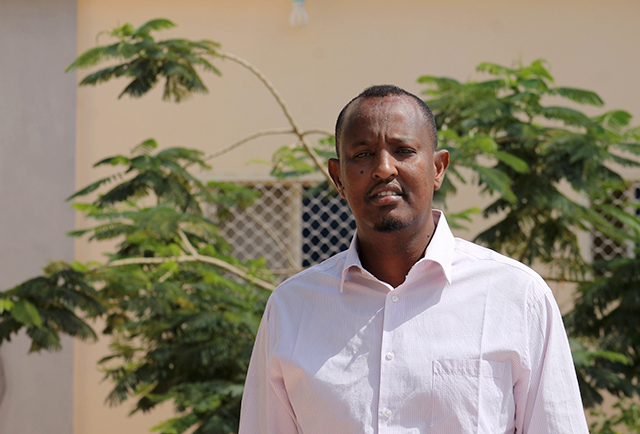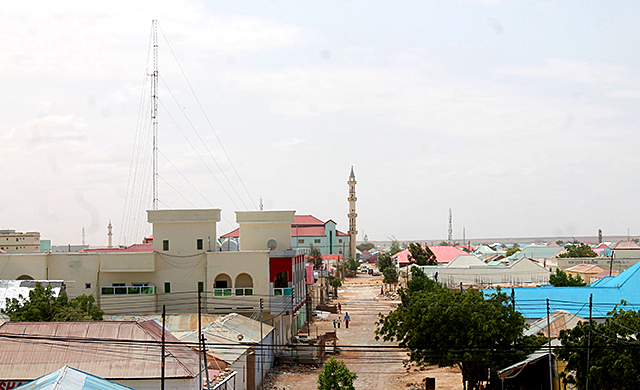Farm
VIP

MinnPost photo by Ibrahim Hirsi
Yasin Jama: “From the get-go, we were committed to improving government services for the public.”
GAROWE, Somalia — For the better part of the 2000s, Yasin Jama spent most of his free time with friends at Starbucks coffee shops in Minneapolis, contemplating what he could do for Somalia, especially the semi-autonomous northeastern state of Puntland from which he hails.
At the time, Jama served as a medical laboratory technician for various hospitals — including HealthPartners, Park Nicollet Clinic and Fairview Hospital — in the Twin Cities metro area. But what kept him up at night in those years wasn’t necessarily testing and recording blood samples. It was the urge to improve Puntland, which was founded in 1998 and has since enjoyed relative peace and tranquility, while also seeing dramatic economic growth, political development and waves of returnees from North America, Europe and Australia.
So in 2007, Jama took his first step toward that mission: He traveled more than 8,000 miles to Garowe, the capital city of Puntland, to set up an electronic system that would help the government issued state identification cards to its residents, much like state driver’s licenses in the U.S.
To do that, Jama founded PII Tech, LLC, a public-private partnership-based company that has since expanded to quickly modernize government services in Puntland, including issuing driver’s licenses and birth certificates as well as vehicle and business registrations.
“From the get-go, we were committed to improving government services for the public,” Jama said. “We also wanted to be a good example for the diaspora community, to show them that they can come back and share their knowledge and experience.”
A return to Somalia
As in many other regions in Somalia, it’s not uncommon in Puntland to find people who have returned from abroad to establish companies, or to serve in government or in nonprofit sectors, said Saadiq Abshir Garaad, a longtime legislator in the Puntland Parliament.
“We have seen more and more people coming back … in recent years,” he said. “They are investing in new development projects; they are building new homes and businesses; and they are coming back to raise kids here.”
There’s no data showing the exact size of the returnee population in this region, but unofficial estimates put it between 3,000 and 5,000 — and many are visible in the state’s political and private sectors.
Today, the majority of the political elite in Puntland are from the U.S., Canada, Australia or Europe. The current vice president, Ahmed Elmi Osman, for instance, is from Boston; the minister of education, Abdullahi Mohamed Hassan, is from Minneapolis; and the last two former presidents, Abdiwali Mohamed Ali and Abdirahman Mohamud Farole, are from New York and Australia, respectively.
Other returnees have found a home in the private sector, establishing high-end hotels, restaurants and shopping malls — businesses that often target those returning from Western countries and their families.
This increase in the number of people returning to Somalia is — in part — possible because of the efforts of high-profile government officials beckoning Somalis abroad to bring their expertise back to the east African country, which in recent years has emerged from decades of violent tribal conflicts.
In a speech at Augsburg University earlier this month, as the Star Tribune reported, Minister of Foreign Affairs Ahmed Isse Awad called for Somali-Americans in Minnesota to participate in the ongoing process to rebuild Somalia.
“Economic activity is picking up throughout the entire region,” he said in the speech. “To sustain that progress we need the diaspora to engage more in Somalia, to continue to contribute.”
But Jama began mapping out his return years before government officials like Awad started preaching the return gospel, and before many cities in Somalia became the bustling economic and social hubs they’ve become today.
Modernizing government services
The idea, for Jama, began in the early 2000s with simple conversations about the political and economic conditions in Puntland with friends at Minneapolis’ Cedar-Riverside neighborhood Starbucks coffee shop, a popular hangout spot for Somali-American men and home to sometimes intense debates over the clan-based politics in Somalia.
As many engaged in those fruitless debates, however, Jama was busy sketching out a plan to replicate some of the state government services he admired about Minnesota. He was especially thinking about a system that would enable Puntland to issue identification cards to its residents, a system that had never before existed in the region.
So in 2007, he formed a preliminary plan to establish a computerized ID system and traveled to Garowe to sell the idea to government officials. “We thought creating a state ID system for the region was the most important thing we could do,” Jama said. “You cannot have a strong government if you don’t know your residents.”
When he met with the officials and explained his plan to establish a secure, computerized system — involving eye and fingerprint scanning — for issuing state ID cards in partnership with the government, the officials welcomed the idea.
“They said, ‘Yes, we do need it,’” Jama noted. “They asked us, ‘Can you guys do it?’”
Besides state IDs, Jama learned that there had been a dire need for a computerized system to also issue driver’s licenses as well as vehicle and business registrations. So Jama also took on the additional projects.
After the assessment meeting in Garowe, Jama, who was then employed with HealthPartners as a medical laboratory technician, returned to Minnesota to build the PII Tech company.
Later that year, Jama launched the company after receiving a contract from the Puntland government to issue driver’s licenses and state IDs. Two years later, PII Tech got another contract to help develop a system to register vehicles and collect taxes. And in 2017, the company added a process to issue business registrations to its services.
Before PiII Tech’s involvement, the government’s process to license drivers and register vehicles and businesses was done manually and wasn’t always reliable, said Abdirahman Nour Ahmed, head of the Puntland Department of Transportation.
“There were a lot of errors,” he added. “The taxation system was not organized. But since PII Tech started operating here, those errors have been reduced. This kind of technology is essential, and we hope it will be a model for states across Somalia.”
Attachments
Last edited:



